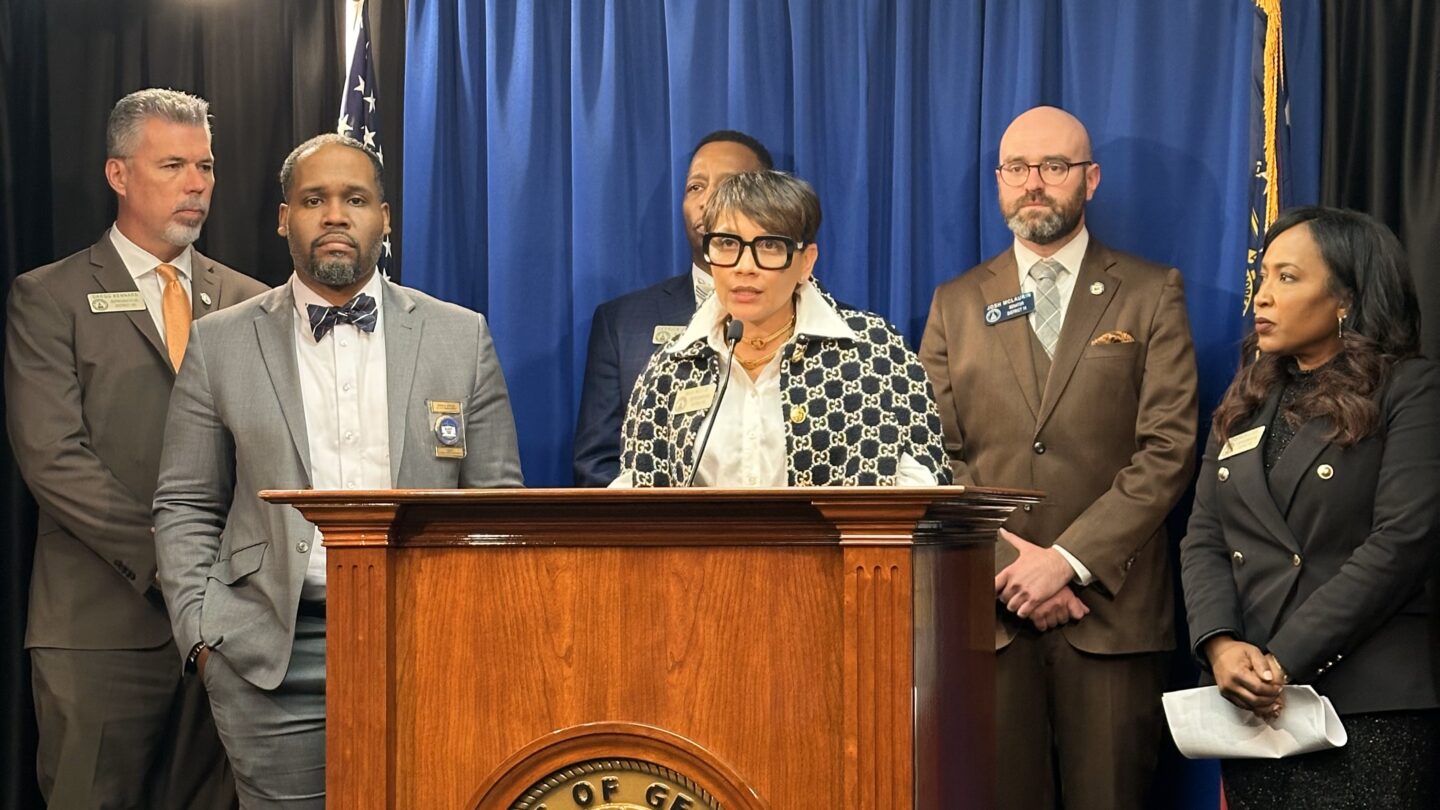Opposition to Georgia's cash bail bill grows amid legal and constitutional concerns

Advocates are calling a bill headed to Georgia Gov. Brian Kemp’s desk a step back from years of criminal justice reform.
Senate Bill 63 would add more than two dozen offenses to the list of charges requiring cash bail while limiting charitable bail funds, including those ran by churches, protest groups and individuals, from securing the release of no more than three people a year from jail.
According to Republican State Rep. Houston Gaines, it’s needed to target repeat and violent offenders and to prevent no-shows in court. However, more than half of the additional crimes that would now require cash bail are typically misdemeanors.
“This legislation will make it clear that Georgia is not going down the path of failure seen by other states and communities that have eliminated cash bail,” Gaines said. “It’s been an unmitigated disaster.”
Opponents of the measure say it could cause people accused of crimes to lose their jobs, homes, custody of their children and even their pets when they land in jail and can’t afford the sum of money that is required in exchange for their release.
In 2022, Sherry Baird and her beloved Shih Tzu named Onyx were giving a friend a ride, when police pulled her over and then booked her into the DeKalb County Jail.
“[Onyx] went everywhere with me and she would cry if she couldn’t come with me,” Baird said, describing their relationship.
A judge granted Baird a $10,000 bond, but she couldn’t afford it. So, Baird spent the next five weeks behind bars.
When she was finally released, officials allegedly told Baird that Onyx had been taken to a local animal shelter and adopted. She says she’s still distraught about it.
“That’s not the way that it was explained to me,” Baird said. “I’m overwhelmed with guilt that I let her down.”
Court records show Baird has still not been indicted for the crime she was accused of; however, the now-60-year-old woman believes that if the national nonprofit Bail Project hadn’t posted her bail, she’d still be in jail two years later.
“I think that’s really unfair, especially in the South,” Baird said. “Most of us, we don’t have a lot of money. And so, they’re passing legislation that suits them. It doesn’t suit the fact that that dog has a home and it knows where it wants to be. So if they do that, they’re going to have more dogs in shelters and you’re going to have more kids in foster care. It’s going to be a trickle-down thing.”
The Bail Project’s Director of Policy Erin George says it has paid bail for over 1,500 Georgians since 2019. Of those, about 90% have returned to court.
“What this proposed policy is doing is doubling down on the failed tough-on-crime policies of the past,” George said. “You know, we have ended up in the circumstance of mass incarceration and mass pre-jailing exactly because of policies like this.”
George said the problem with cash bail is “that privilege of pretrial freedom is only afforded to those who can afford to pay their bail.”
“There is evidence across the country that reducing or eliminating the use of cash bail actually reduces re-arrest and also can simultaneously reduce jail populations,” George said.
The Fulton County Jail is currently under federal and state investigation for its overcrowding and dangerous conditions. Eleven people have died while in custody since the beginning of 2023.
Democratic lawmakers believe Senate Bill 63 could make things worse if more people are held in jail for longer.
Just before the bill passed the Senate and House this week, State Rep. Tanya Miller highlighted the bipartisan criminal justice measures that were implemented under former Gov. Nathan Deal’s administration between 2011 and 2018 such as accountability court and cash bail reform.
“These reforms were designed to contribute to public safety by helping people turn their lives around and not recidivate so that they can become contributing members to their communities and not simply more experienced criminals,” Miller said.
Democratic State Sen. Josh McLaurin said there are also legal and constitutional concerns, specifically around the idea of groups, like churches, not being able to do mass bonding.
In Citizens United v. Federal Election Commission, the Supreme Court held 5-4 that the First Amendment allows “unlimited money” to flow to political campaigns, according to McLaurin.
“If that is the law of the land, then it’s kind of absurd to say that a church that wants to exercise its right, its expressive right to support its community members, again, by just spending money — and they’re not making money doing that, they’re not like a company that needs to be regulated and has an income stream but they’re just donating purely voluntary dollars based on a sincerely held belief — then it would just be a lot of hypocrisy,” McLaurin said.
Under Senate Bill 63, churches and other groups or individuals that run charitable bail funds would be required to register as an official bond company. Georgia law states only the county sheriff can decide who is approved.
Another criticism of the bill is that it seems to target protesters. This comes after three activists were charged last year with charity fraud and money laundering for helping individuals arrested at protests over Atlanta’s controversial public safety training center find attorneys and post bail. The project is known as “Cop City” by protestors, and the state has also charged dozens of them with domestic terrorism and racketeering.
The American Civil Liberties Union announced they intend to file a lawsuit if the measure is signed into law.
The bill is being reviewed by the governor’s office.








